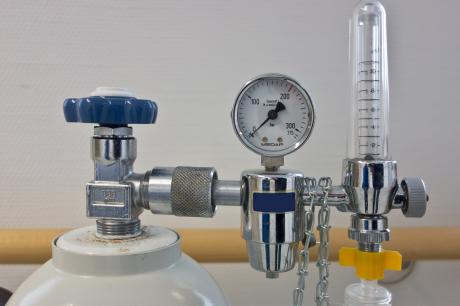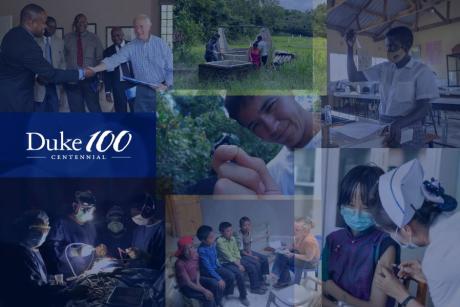
Christmas season 2014 at the Ibingira tree farm in Uganda. From left: Lydia Ibingira, principal of Crane Academy K-12 School; William Reichert, founder of the Makerere BME Program; and Charles Ibingira, principal of the Makerere University College of Health Sciences.
Published September 23, 2016 under Education News
Duke students interested in biomedical engineering (BME) and global health now have a new opportunity to fuse their interests in a collaborative trans-continental partnership. The recently established Duke-Makerere University BME Partnership will connect students and faculty in the BME program at Duke with their peers at Makerere University (MUK) in Kampala, Uganda, to build teaching capacity and design skills.
The program, initiated by BME professor William Reichert, aims to give biomedical engineers and global health practitioners tools to design and implement healthcare technologies in low-resource settings.
Collaborations between Global Health and BME at Duke
The new partnership builds on a rich BME-global health environment already present at Duke. Engineering World Health (EWH), founded by BME and global health professor Robert Malkin, has served for several years as a union between the two disciplines. EWH focuses on improving health through engineering, especially in low and middle income countries. Now an independent entity with over 25 chapters, EWH is known mostly for sending students to low-resource settings to assess and repair medical equipment.
More recently, BME and global health professor Nimmi Ramanujam founded Pratt and DGHI’s Center for Global Women’s Health Technologies (GWHT). The center focuses on research and education relating to women’s cancers and maternal-fetal health.
Creating a New Collaboration across Disciplines and across the Globe
Adding to the BME-global health collaborations at Duke, Reichert and BME Chair Ashutosh Chilkoti spearheaded development of the Duke-MUK BME Partnership after Reichert spent the 2014-2015 academic year as a Fulbright Scholar teaching at MUK. Teaching and conducting a major curriculum revision reinforced in Reichert the idea that intelligence and the capacity for hard work are uniformly distributed characteristics, but access to opportunity is the key global differentiator.
Reichert observed the hard work, dedication and sheer joy of learning of his Ugandan students during his Fulbright. One day, for example, all of his environmental engineering students showed up for a midterm exam despite the outbreak of a student riot on campus. “Police were firing tear gas grenades and rubber bullets while students were running amuck,” he recalled. “When I got to the exam room, every single student in the class was there. That was a group of students that values education!”
After his Fulbright experiences, Reichert’s professional priorities shifted from domestic biomedical research to building BME capacity at MUK and in Uganda. “The main deficit for the Makerere University BME program is the extreme shortage of qualified instructors,” Reichert commented. “Since the gateway degree for becoming an instructor is the Masters of Science (MS) degree, setting up a program to enable Makerere BME grads to come here and get an MS in BME seemed like a no-brainer.”
The partnership introduced an undergraduate senior design class and a graduate program spanning both universities. These classes build BME capacity in Uganda by training BME professionals and future MUK faculty. Reichert hopes to expand the inventory of classes that are offered to students on both campuses as the partnership grows.
Opportunities at the Undergraduate and Graduate Levels
The first Duke-MUK course, Biomaterials and Artificial Organs, was initially offered in the fall of 2015 to about 25 Duke seniors and graduate students and about 30 MUK students. In this class, Duke students have the opportunity to immerse themselves in a semester-long group project with their Ugandan counterparts. For example, Duke BME student Ashley Reid worked with five MUK students on a project, “Orthopaedic Implant Supply Chain in Kampala, Uganda: Public-Private Workarounds,” which was submitted to BMC Health Services Research for publication with Reid as first author.
Another course, Transcontinental Design, is offered to ten students in the spring, including BME juniors and seniors and graduate students in BME and global health. In this course, which includes a trip to Uganda, Duke students vet and provide feedback on healthcare-related design project ideas submitted by MUK students. The projects that are best suited for collaboration—where the Duke students can provide meaningful design contribution and not just consulting—move forward to the Duke-MUK collaboration phase. The selected Duke-MUK teams then work together on technical solutions to healthcare needs that are likely to be embraced by Ugandan clients.
The Duke BME Master of Science program is now open to MUK students who have completed their undergraduate BME degree and who have been selected by a committee of Duke and MUK faculty for the Duke-MUK Scholar Award that covers all tuition, fees and living expenses. The students will spend two semesters at Duke, studying biomedical instrumentation and health diagnostics that are most critical to health in Uganda. The following summer, students will return to MUK to complete their master’s dissertation in Kampala.
The first two MUK students participating in the graduate program, Kenneth Rubango and Henry Kiwumulo, arrived at Duke in mid-August. Their dissertations are being supervised by BME professors Roger Nightingale and Kathy Nightingale.
Building Collaborative Capacity
“Our main goal now is to vastly improve the communication piece,” Reichert said. To help address this challenge, Reichert and Kearsley Stewart, associate professor of global health, recently received funds from Bass Connections to establish a video conferencing center in a room donated by the Makerere School of Pharmacy.
The Duke-MUK BME Partnership currently has a five-year commitment from both universities to enhance collaborative teaching and learning experiences. The program is sponsored by the Duke BME Department, the Duke Office of the Provost, the Duke Global Health Institute, the Pratt School of Engineering, the Duke Graduate School, and the Duke Africa Initiative.
Learn more about global health collaborations between DGHI and Makerere University, one of DGHI's priority partnership locations.
These classes build biomedical engineering capacity in Uganda by training BME professionals and future Makerere University faculty.


